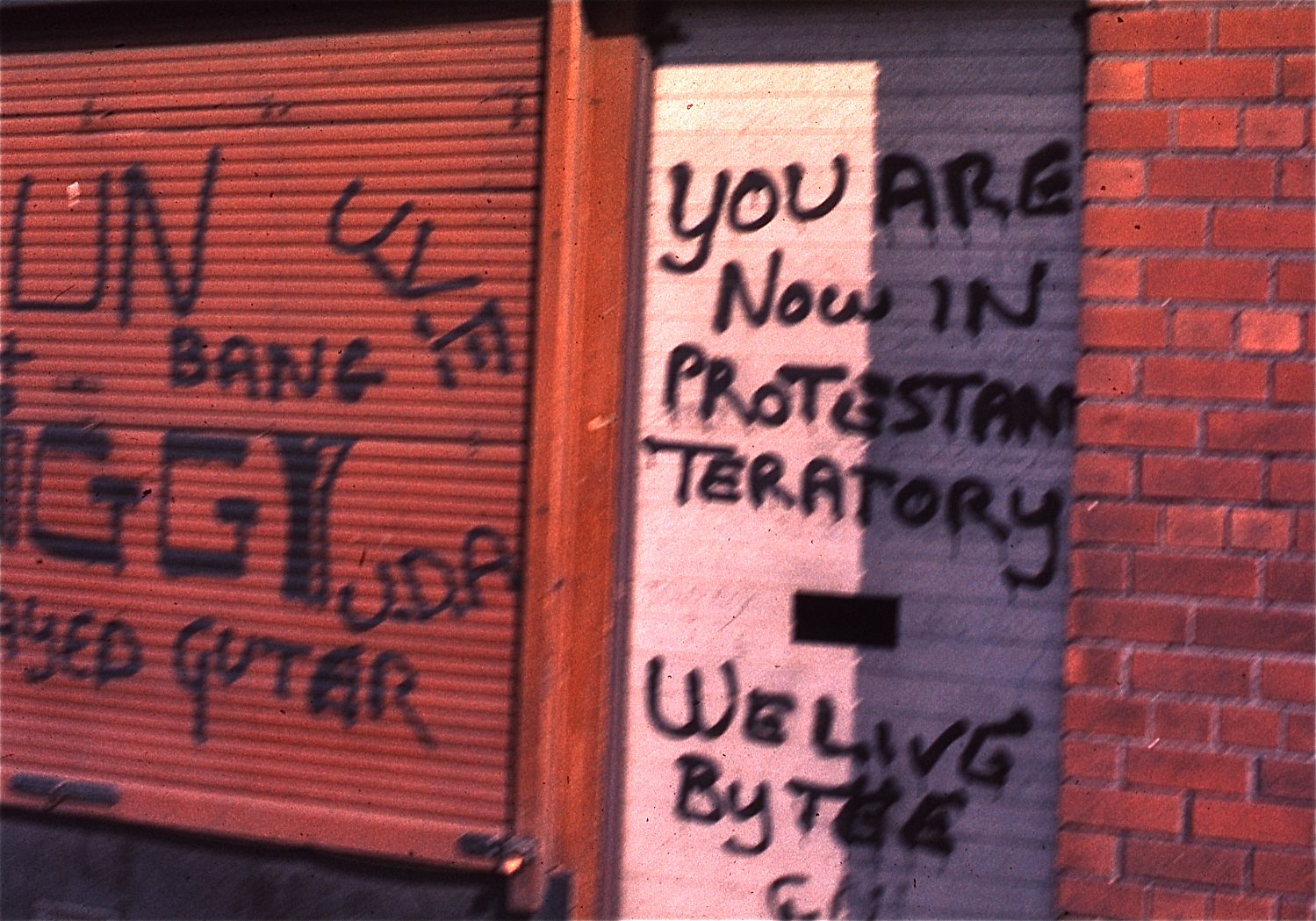
The picture above depicts graffiti scrawled in Belfast, Northern Ireland, in the 1970's. During part of my mission, I spent time in Belfast and its suburbs, areas heavily affected by The Troubles (see https://en.wikipedia.org/wiki/The_Troubles).
While there, I witnessed several instances of street preaching--echoes of the violent religious civil wars turned nonviolent only recently. The sermons often included graphic descriptions of the afterlife, warnings of God's wrath against non-believers, and intense rhetoric and passion. On one occasion, I remember a man saying into a megaphone, "Remember this! The streets of heaven are paved with gold, but the streets of hell are paved with the blood of sinners."
"Fire and Brimstone" Rhetoric
One of the problems with this sort of rhetoric is that it is intrinsically hypocritical. Talking down to an audience so forcefully requires an air of self-righteous anger--no room for humility in scolding. In "Sermon on the Plowers" by Latimer, a speech filled with 'fire and brimstone' rhetoric (particularly upon London and her clergy), this principle is apparent. He writes:
I fear me some be rather mock gospelers than faithful plowmen. I know many myself that profess the gospel and live nothing thereafter...I know them [and] there is as little charity and good living in them as in any other. (Latimer 37)The condescension in these words, perhaps necessary in a speech of such ferocity, is directly reversed in John Colet's Sermon of 1512. He uses the opposite attitude--that of humility.
"Humble Exhortation" Rhetoric
Introducing his speech, Colet writes:
I judged it utterly unworthy and unmeet, yea, and almost too malapert, that I, a servant, should counsel my lords; that I, a son, should teach you, my fathers. Wherefore...I pray you and beseech you that this day ye would sustain my weakness with your goodness and patience. (Colet [2])While any man can toss out a token of modesty, Colet continues the pattern by referring to the clergy in need of reform as "us" rather than "them" throughout the sermon.
Which one is better?
I think most of us, being put in a discussion, would side with Colet's rhetorical strategy. Humility and honest encouragement, we would say, is far more effective than the rhetoric of fear. As a general rule, I would tend to agree. However, sometimes neither of them is effective.
In the Book of Mormon, the prophet Mormon tries to convince his people to repent. Concerning this attempt, he writes: "when I speak the word of God with sharpness they tremble and anger against me; and when I use no sharpness they harden their hearts against it." (Moroni 9:4)
Was this the situation of the Catholic Church? Was reform through exhortation possible, or was a multi-century multinational conflict the only way to break free?
Image credits: "Protestant graffiti in Belfast, Northern Ireland, 1974, during the Troubles" by George Garrigues, licensed under CC ASA 3.0

Cicero taught that it is far better to be loved than feared. I believe this is true, and most especially when that principle is applied to Christianity. If a person loves God they will be far more likely to keep His commandments than someone who is taught that God is wrathful and ready to condemn. I saw this a lot in my mission in the South. Everyone loved God and He is a common topic of conversation. People consistently try to follow what is taught in the Bible because they love Him.
ReplyDeletePersonally, I believe a middle approach must be taken. All the Fire and Brimstone brings is violence and distrust, whether it be of atheists, or people of various religions. On the other hand, a gentle exhortation is useless if no one is willing to listen. By taking a path somewhere down the center, one should be able to attract an audience while simultaneously not offending said audience by claiming that they are worthless souls without you particular church.
ReplyDeleteI think this problem is very much helped in our church where we’re mostly spoken to by lay members. It keeps most members in a state of humility when they’re asked to address a large body of people, and encourages them to feel on equal footing with the rest of the church. By being edified and then expected to edify, Latter-Day Saints maintain a healthy equilibrium.
ReplyDeleteQuite often, I think it depends on your situation. I think from a leadership perspective especially, sometimes humble exhortation just won't get the message across. However, equally as important -especially in situations where you are speaking to peers- is being humble and encouraging rather than being harsh. I think as humans, we all respond differently to each type of exhortation
ReplyDelete